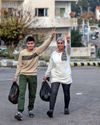
Like many people, I have had Covid and I have had long Covid. They are very different experiences. I first caught the disease at the start of the pandemic in March 2020, when its effects were relatively unknown. It was unnerving and highly unpredictable. I did not get particularly sick, but I probably gave the virus to my father, who did. Back then, Covid appeared to be the great divider - the old were far more at risk than the young, and those with preexisting vulnerabilities most at risk of all - and the great equaliser. Almost everyone experienced the shock and the fear of discovering a novel killer among us. We soon acquired a shared language and a sense of common purpose: to get through this together - whatever this turned out to be.
I developed long Covid last year, six months after I had caught glandular fever. The fresh bout of the Covid virus made the effects of the glandular fever far worse: more debilitating and much harder to shake. Some mornings it was a struggle to get out of bed, never mind leave the house.
It was as though Covid latched on to what was already wrong with me and gave it extra teeth. The experience was unpredictable in a very different way from the drama of getting sick in 2020: not a cosmic lottery, but a drawn-out bout of low-level, private misery. Good days were followed by bad days for no obvious reason, hopes of having recovered were snuffed out just when it seemed like the worst was past. Long Covid is less isolating than being locked down, but it is also a lonelier business than getting ill at the peak of the pandemic was, if only because other people have moved on.
The physical and psychological effects of these different versions of Covid are oddly parallel to its political consequences. The disease turns out to be its own metaphor.
Denne historien er fra March 15, 2024-utgaven av The Guardian Weekly.
Start din 7-dagers gratis prøveperiode på Magzter GOLD for å få tilgang til tusenvis av utvalgte premiumhistorier og 9000+ magasiner og aviser.
Allerede abonnent ? Logg på
Denne historien er fra March 15, 2024-utgaven av The Guardian Weekly.
Start din 7-dagers gratis prøveperiode på Magzter GOLD for å få tilgang til tusenvis av utvalgte premiumhistorier og 9000+ magasiner og aviser.
Allerede abonnent? Logg på

'It's really a disaster' The fight to save lives as gang war consumes capital
Dr James Gana stepped out on to the balcony of his hospital overlooking a city under siege. \"There's a sensation of 'What's next?'. Desperation is definitely present,\" the Médecins Sans Frontières (MSF) medic said, as he stared down at one of scores of camps for displaced Haitians in their country's violence-plagued capital.

Trailblazers The inspiring people we met around the world this year
From an exuberant mountaineer to a woman defiantly facing the guns of war, here are some of the brave individuals who gave us hope in a tumultuous 2024

Votes of confidence
From India to Venezuela and Senegal to the US, more people voted this year than ever before, with over 80 elections across the world. With rising authoritarianism and citizen-led resistance revealing its vulnerabilities and resilience in the face of unprecedented challenges, has democracy reached its breaking or turning point?

Out of touch How president sealed his own fate in martial law gambit
For Yoon Suk Yeol, this month's short-lived martial law declaration wasn't just a catastrophic miscalculation - it was the culmination of a presidency that had been troubled from the start.

Son of the soil Who is François Bayrou, the farmer turned prime minister?
François Bayrou, the new French prime minister, calls himself a country man. A tractor-driving \"son of the soil\" and breeder of thoroughbreds, he has run for president three times, saying his rural roots and centrist politics led him to try to find common ground between left and right.

Power plant workers keeping the lights on
The Guardian Weekly visits a Soviet-era coal-fired thermal installation to learn how it has held up to Russian attacks

Prince charmed Alleged spy scandal may have exposed China threat
Prince Andrew should be commended for doing Britain a great service, according to longstanding China watcher Charles Parton. The now marginalised royal has, the analyst observed, \"almost single handedly\" succeeded \"in highlighting the threat to free and open countries\" posed by the contemporary Chinese state.

In Moscow, a new life of secluded irrelevance awaits Assad
He was whisked away without a last message to his people, the aircraft's transponder deliberately switched off to avoid detection as it departed from an airbase in Syria.

'We fear new oppression' Alawites worry over rebel rule
To prepare khubeiza, the leaves of the kale-like plant must be roughly chopped and sauteed with onions, garlic and a dash of salt. According to folklore, the recipe originated among the Alawite communities who lived in Syria's mountainous coastline where the fibrous, wild-growing plant can be found in abundance. So poor were the Alawites in Ottoman times, the story goes, that the only food they could find to eat was khubeiza, which sprouts like a stubborn weed every spring.

'Gisèle is waiting for explanations'
The Pelicot rape trial has horrified the world. But as it comes to an end, the questions it has raised about French society and rape culture have still not been answered.